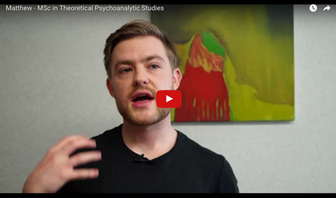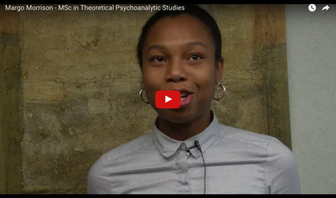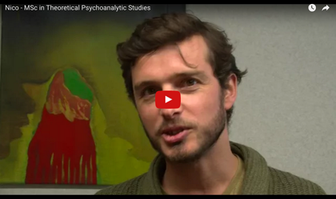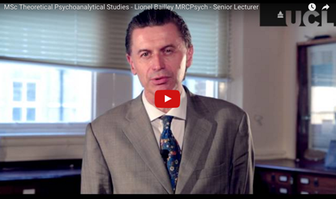MSc in Theoretical Psychoanalytic Studies
The MSc in Theoretical Psychoanalytic Studies is located within the Psychoanalysis Unit in the Research Department of Clinical, Educational and Health Psychology within the Division of Psychology and Language Sciences at UCL.
The Masters programme was set up as a collaborative venture between the Unit and the British Psycho-Analytical Society in September 1996.
This unique one-year full-time (up to five years flexible/modular) course covers historical and current theoretical developments worldwide, and is largely taught by fellows of the Institute of Psychoanalysis together with scholars from related fields.
- PROGRAMME SUMMARY
The MSc in Theoretical Psychoanalytic Studies programme provides a comprehensive critical exploration of the development of current psychoanalytic thinking, beginning with the foundational works of Sigmund Freud and showing how different psychoanalytic traditions have developed in dialogue with both Freud and each other. The programme is academic in nature, concerned with the theoretical issues that emerge from the close reading of psychoanalytic texts, but these issues are always considered in relation to the clinical practice of psychoanalysis.
The programme is taught by a wide range of visiting lecturers, expert in their field, who are for the most part also practicing clinicians, and this ensures that consideration of how psychoanalytic theory both informs and is informed by the clinical setting is central. In addition to providing a thorough and nuanced exploration of various psychoanalytic paradigms, the programme also uniquely aims to bridge the gap that often exists between psychoanalysis as conceived by professional psychoanalysts, and as presented in many psychoanalytic academic programmes.
The programme is located within the Psychoanalysis Unit, a research and teaching unit established by the late Professor Joseph Sandler and now part of the Research Department of Clinical, Educational and Health Psychology. The Unit has strong links to the International Psychoanalytic Association and a number of important national and international affiliations, including the Menninger Foundation and leading units and scholars at Yale, Harvard, Cornell and other overseas universities. It has an especially strong link with the Anna Freud Centre here in London, which hosts several other, related UCL graduate programmes.
- APPLICANTS
Students entering this programme come from a wide variety of backgrounds. Some enter the programme after undertaking psychotherapy training to deepen their theoretical understanding. Others come to it with little knowledge of psychoanalysis, perhaps considering training in the future, or wanting to relate psychoanalytic ideas to theoretical study in related disciplines.
Over the last sixteen years the programme has accepted applicants who have previously worked or studied in a variety of areas, including Psychology, Clinical Psychology, Philosophy, Psychiatry, English Literature, Fine Arts, Women's Studies, Economics, Politics, Social Science, History of Philosophy and Science, Anthropology, Theology, Film, Media and Cultural Studies, Law, Journalism, Investment Banking, Television and Radio Production, Publishing and Marketing.
Our applicants range in age from graduates coming straight from university, to more mature individuals who are maybe looking to either change career direction or enhance their current career by deepening their understanding of the subject. The programme attracts many international students and in the past students have come from countries including India, Mexico, Peru, Portugal, Japan, Italy, Singapore, USA, Chile, Greece, Taiwan, Ireland, Germany, Denmark, as well as the UK.
- PROGRAMME STRUCTURE
The programme is organized into four taught modules, each divided thematically into series covering particular psychoanalytic schools or topics. Modules run concurrently throughout the year, but the focus of the curriculum varies slightly as terms progress.
The following description of the academic year is as currently offered. Changes to distribution of teaching are made year on year but in general terms this offers a good indication of curriculum progression throughout the academic session.
Your year will begin with a short series of seminars introducing the nature of the discipline, and offering an overview of the history and development of psychoanalytic ideas to be covered throughout the year. In the first term, you will focus in great part on the works of Sigmund Freud, with the first months offering a thorough and careful reading of the key founding texts of the discipline. Other topics, such as empirical evidence for psychoanalytic theories, the links between philosophy and psychoanalysis, or question of diversity, diffrence and identities in psychoanalysis will also be considered. You will also begin to be introduced to the major schools of psychoanalysis, starting with classical and contemporary adaptations of the Freudian tradition.
As the year progresses, you will continue with a close reading of foundational Freudian texts, but you will shift the focus somewhat to the way in which psychoanalytic theory has been taken up by different schools, with particular attention to those in the British Psychoanalytic Society. The work of Melanie Klein, Wilfred Bion and D.W. Winnicott is covered extensively, as are the Lacanian and modern French traditions. You will also begin to address topics central to psychoanalysis, such as how sexuality or trauma figure within and have shaped psychoanalytic theory. Finally, you will start working on your dissertation project, and will be assigned a supervisor, typically by the middle of the term.
Further along the year you will continue to cover the topics and themes outlined above, as well as other areas of study, including how psychoanalysis has been taken up by other disciplines and how psychoanalytic theory is taken up in contemporary clinical practice. Revision seminars for a number of series are also offered in the final weeks of teaching to help you prepare for exams.
Throughout the taught part of the year, you will be attending lectures and tutorials on Friday afternoons and Saturdays, when the vast majority of teaching is scheduled. You will be expected to prepare for each seminar by reading papers on the topic, so it is essential that you plan ample time for independent study and revision. You will also be expected to hand in coursework at various points in the year, revise for exams, which you will sit in the summer, and work on your dissertation, typically due at the end of the summer.
Foundation Course Pathway
The Foundation Course Pathway is an option sometimes available to students who have been accepted into the Foundation Course at the Institute of Psychoanalysis, who plan to do the Foundation Course concurrently with the programme at UCL and who wish the Foundation Course to count towards their degree. Students in the Foundation Course pathway follow the programme structure outlined above, but take the Foundation Course instead of one of the four programme modules and are then assessed by UCL on the curriculum covered in the Foundation Course.
If you undertake the programme in its Foundation Course pathway, you should be mindful that, in addition to following the UCL schedule and assessment patters, you will also be attending evening lectures and clinical seminars off-site at the Institute of Psychoanalysis, and that teaching at the Institute of Psychoanalysis may not entirely overlap with UCL term dates and deadlines.
Restrictions apply to the Foundation Course Pathway and not all students are able to access this. Students interested in undertaking it should state this clearly in their statement so that it can be discussed at interview.
- MODULE DESCRIPTIONS
The following module descriptions are as currently offered. Changes are made to offerings year on year but in general terms these offer a good indication of the content that is likely to be covered.
Fundamentals of Psychoanalytic Theory/Freud reading Seminars
This module aims to develop a critical understanding of the main psychoanalytic theories and models of the mind as these developed in the work of Sigmund Freud. The module introduces an understanding of how the theories developed in conjunction with understanding particular pathologies, such as hysteria, which is at the heart of psychoanalytic theory as originally formulated by Freud. It also introduces students to the significance of the clinical case report from Freud through to the present day.
Major Schools of Psychoanalysis
This module traces the development of psychoanalysis in France and Britain since Freud’s death. It is divided into different series covering the work of Melanie Klein, Anna Freud, DW Winnicott, Wilfred Bion and Jacques Lacan and the Modern French Tradition, amongst others.
Special Topics in Psychoanalysis
This module covers various aspects psychoanalytic theory and practice. It is divided into different series covering a range of topics, including neuroscience, trauma, sexuality and contemporary psychoanalytic technique.
Applications of Psychoanalysis
This module is divided into different series that aim to demonstrate the application of psychoanalytic ideas to understanding the wider culture and their contribution to other disciplines. Series within this module cover areas such as philosophy and psychoanalysis, psychopathology in psychoanalysis, psychoanalysis and other disciplines (including literature, history, music and religion). A further series addresses issues concerning diversity, difference and identities.
Students in the Foundation Course Pathway take the Foundation Course at the Institute of Psychoanalysis instead of the Applications of Psychoanalysis module. It is unfortunately not possible for students in the Foundation Course Pathway to register for the Applications of Psychoanalysis module in addition to the Foundation Course as part of the MSc itself, though students can register for MSc in its Regular Pathway and then take the Foundation Course independently from the MSc.
- MODES OF ATTENDANCE
The programme currently offers three different modes of attendance: Full-time, Part-time and Modular/Flexible attendance.
Students should aware that the mode of attendance in many cases determines eligibility for funding and/or loan options, so students wishing to apply for funding or a student loan should consult with the relevant funding/loan entity prior to making a decision.
Overseas students requiring a visa to study in the UK should also be aware that certain visas may impose restrictions on the mode of attendance permitted. Overseas students should consult the specific terms of their visa prior to making a decision. Further information can be found on the UCL Prospective Students Immigration Information website.
Full-time attendance
Students in full-time attendance register for and complete the four taught modules and the dissertation module in one year.
Part-time attendance
Students in part-time attendance complete all five modules in two years, as per the following schedule: three taught modules in the first year and one taught module plus the dissertation in the second year.
Students in the Foundation Course pathway are required to take the Foundation Course at the Institute of Psychoanalysis in their second year.
Modular/Flexible attendance
Students complete all four taught modules and the dissertation module in up to five years from enrolment. Modular/Flexible students select their module choices and module load year on year, which offers more flexibility. Some restrictions apply as to the order in which modules can be taken, however,
- TEACHING AND LEARNING
The programme will provide you with a comprehensive and in-depth overview of the development of psychoanalysis as a discipline and current psychoanalytic thinking. You will learn mainly through lectures and seminars as well as undertaking extensive reading in preparation for the seminars. One-to-one termly tutorials will further your personal learning experience, and dissertation supervision will help guide and focus your independent research.
- ASSESSMENT
You will be assessed by three methods: essays, exams and a dissertation project. Each of the four taught modules is assessed by one mid-length essay and an exam. The dissertation is an extended project of independent research.
- LEARNING OUTCOMES
Subject-Specific Knowledge
On successful completion of this programme you will:
- Understand the medical and cultural context in which psychoanalysis began
- Understand how and why the major developments in psychoanalytic thinking over the following century occurred
- Have detailed knowledge of the major theoretical and clinical works of Sigmund Freud
- Grasp the central ideas characterising the three major British groups and the reasons for their differences,
- Be able to compare and contrast the British traditions with other psychoanalytic schools
- Be familiar with debates concerning psychoanalytic thinking in relation to child development, psychopathology, clinical technique and the applications of psychoanalytic ideas to understanding the wider culture
- Understand how psychoanalytic theory can be used as a tool for critical analysis of philosophy and culture
- Through being taught by practising analysts, become aware of how theory is both informed by and informs clinical work
Intellectual, Academic and Research Skills
On successful completion of this programme you will be able to:
- Read the psychoanalytic literature with understanding and reflect critically on the theories presented therein
- Evaluate the arguments for and against a particular psychoanalytic theoretical paradigm
- Critically evaluate the assumptions underlying the use of particular psychoanalytic theories to explain clinical phenomena and be aware of alternative theoretical possibilities
- Define a theoretical topic that is suitable for in-depth study
- Use paper-based and digital resources to identify the relevant literature for comprehensive narrative review of a particular psychoanalytic topic
- Critically review the psychoanalytic literature relevant to your chosen topic
- Develop and sustain a psychoanalytically informed argument to further your understanding of your chosen topic
- Substantiate your argument through reference to published reports of clinical work
Practical and Transferrable Skills
On successful completion of this programme you will be able to:
- Rapidly digest lengthy and complex arguments and write accessible and succinct summaries of them
- Critically reflect on different ways of conceptualising a particular phenomenon, and draw out the assumptions underlying these different perspectives
- Express arguments clearly, succinctly and fluently
- Defend a particular point of view in an argument and support it with evidence
- Manage time and work to deadlines
- Research a topic independently, making use of digital resources as appropriate
- Make use of supervisory support to identify areas for further development
- Self-direct and self-manage a project from planning to execution
- EMPLOYABILITY
This MSc provides a very good background to formal clinical training in psychoanalysis, adult or child psychotherapy or counselling and a number of our graduates pursue these options. Many also continue with their academic studies either at UCL or elsewhere, often registering for a PhD in either psychoanalytic theory or empirical research, or moving into the field of mental health research.
- FEES AND ENTRY REQUIREMENTS
Information concerning fees and programme entry requirements can be found on the MSc Theoretical Psychoanalytic Studies Prospectus site.
- HOW TO APPLY
All applications must be submitted through the UCL Application Portal, via the MSc Theoretical Psychoanalytic Studies Prospectus site.
- CONTACT US
If you have any further questions please get in touch: d.tanner@ucl.ac.uk, +44 (0)20 7679 1899.
 Close
Close





